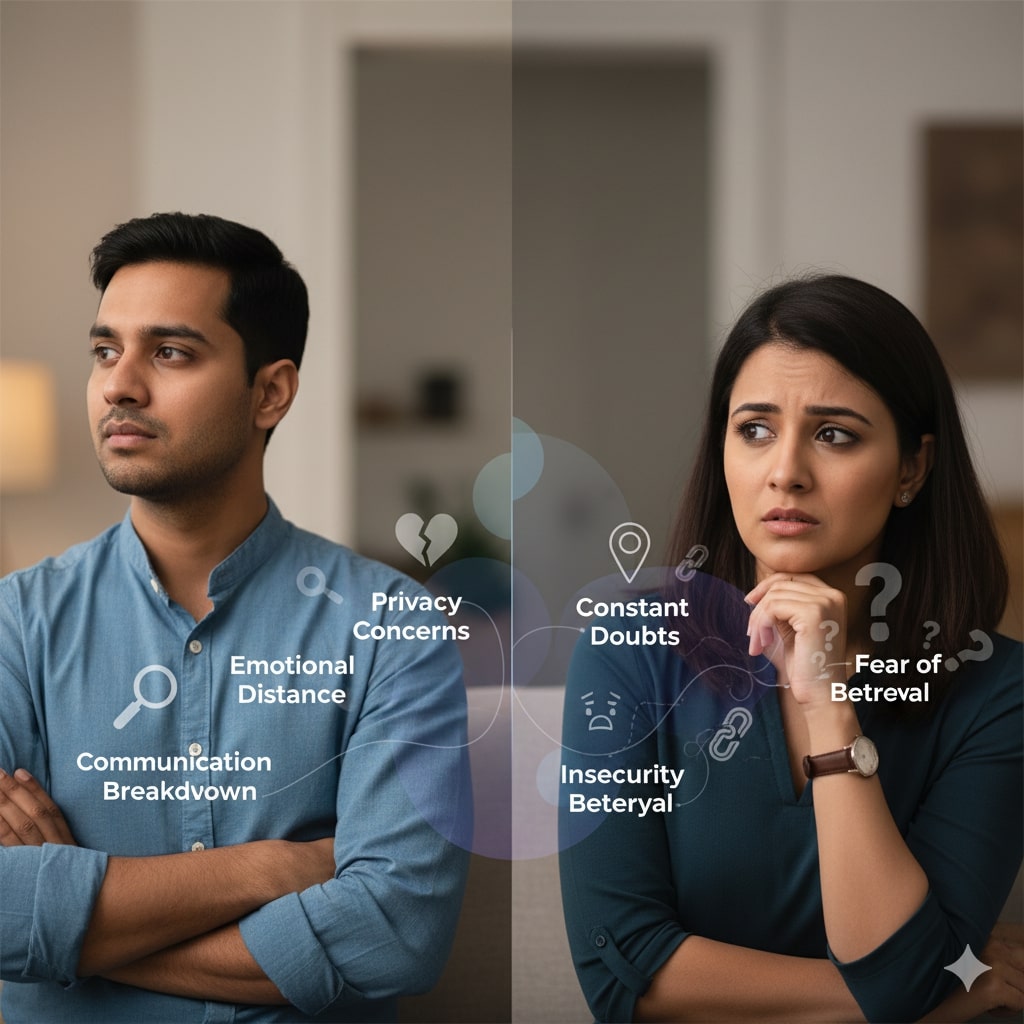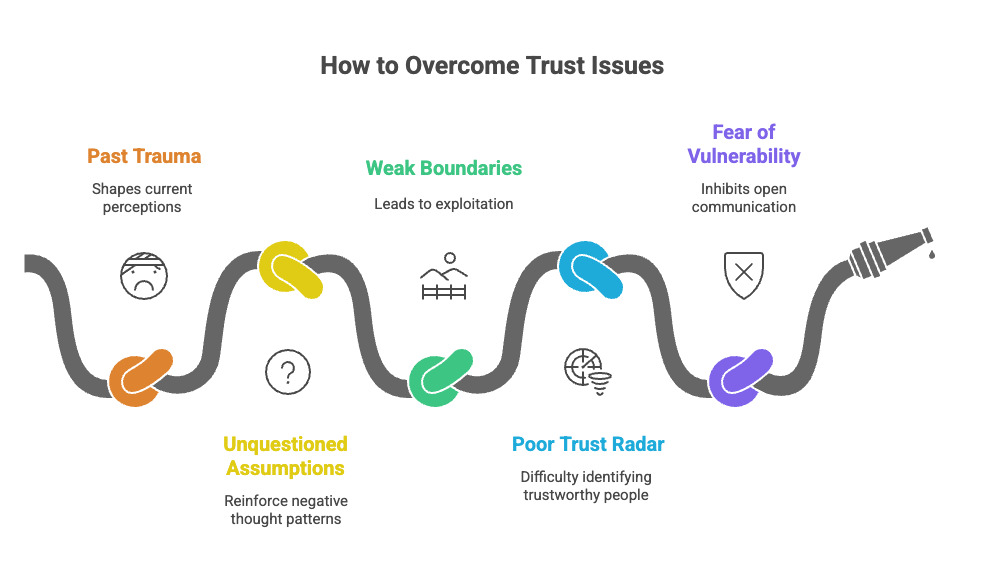
Amaha / / / Understand the Psychology About Why People Say "Never Trust Anyone"
ARTICLE | 6 MINS READ
Understand the Psychology About Why People Say "Never Trust Anyone"
Published on
16th Sep 2025

Dr Anuradha Kabra
MD Psychiatry

Here's something that might surprise you: research from the University of Chicago reveals that only 32% of people believe others can be trusted. That's barely 1 in 3! Even more startling? In India, this figure drops to just 16% according to the World Values Survey. Makes you wonder, doesn't it?
As psychiatrist Dr. Balakrishna from Amaha, Bangalore once said, “When people keep repeating the phrase never trust anyone, it’s not about the world outside; it’s about the wounds they carry inside.”
What Exactly Are Trust Issues?
Trust issues are basically doubts and fears about whether people will keep their word or betray us. It’s that voice in your head that says, “What if they let me down?” even when there’s no reason to think so. When someone says "never trust anyone," they're essentially voicing what their amygdala has been screaming for years. It's not cynicism; it's self-preservation. Trust issues create an invisible barrier between you and the world.
Never Trust Anyone meaning in Hindi
“कभी किसी पर भरोसा मत करो का हिंदी अर्थ है दूसरों पर आँख मूँदकर विश्वास न करना। यह कहावत लोगों को सावधान रहने, अनुभव से सीखने और विश्वास करते समय समझदारी बरतने की सलाह देती है, ताकि धोखे से बचा जा सके।”

Struggling with Trust issues in your Relationships?
Amaha's Therapists are trained in Culture and Person-First Approaches who help you overcome 'Trust Issues' which affect your Well-being and Growth
The Science Behind Why People Never Trust Anyone
Neuroscientists have discovered that trust activates the prefrontal cortex, whilst betrayal triggers the brain's pain centres. Literally, emotional pain hurts like physical pain.
Psychologists say trust is wired into our brains through the release of oxytocin, often called the “bonding hormone.” But when people experience betrayal, rejection, or trauma, the brain actually rewires itself to be more cautious. Neuroscience research shows that the amygdala, the part of the brain linked to fear, becomes hyperactive in people with trust issues.
That’s why some people keep repeating phrases like “never trust anyone”. It’s not just a thought, it's their nervous system on alert.
Root Causes: Where Trust Issues Actually Begin
Childhood Experiences Shape Everything
Most trust issues begin when we're children, watching our parents' relationship dynamics or experiencing broken promises from parents, teachers. A father who never kept his word about weekend trips. A mother who said "everything's fine" whilst clearly upset.
Betrayal Trauma
That ex-partner who cheated. The business partner who disappeared with your investment. The friend who shared your deepest secret. Each betrayal adds another brick to your emotional wall. Toxic workplaces where backstabbing becomes normal.
Cultural Conditioning
Cultural caution: In Indian families, we often hear elders warn us not to be “too open” with others, not to take anything from strangers.
Simply put: every “never trust anyone” has a story behind it.

Signs of Trust Issues in Men and Women
In Men:
- Constantly checking partner's phone or social media
- Assuming ulterior motives behind kind gestures
- Difficulty opening up about vulnerabilities
- Creating emotional distance when things get serious
- Jealousy in relationships
- Anger issues when promises are broken
In Women:
- Questioning partner's whereabouts excessively
- Feeling anxious when partner talks to others
- Difficulty believing compliments or expressions of love
- Comparing current relationship to past betrayals
- Overthinking partner’s actions
- Constant need for reassurance
- Guarded communication, even with close friends
Trust Issues in Relationships
Nothing eats away at intimacy like trust issues. In couples, it shows up as constant checking of phones, doubting late-night work calls, or needing endless reassurance. In friendships, it’s keeping secrets instead of sharing openly.
Ironically, by saying never trust anyone, people end up pushing away the very closeness they crave.
The Vicious Cycle
Trust issues create what psychologists call a "self-fulfilling prophecy." You don't trust anyone, so you behave suspiciously. Your behaviour pushes people away, confirming your belief that people can't be trusted. And round it goes.
Common Reasons Why You Should Never Trust Anyone
There are valid reasons people say don’t trust anyone:
- Past betrayals leave scars : once trust is broken, people tend to stay guarded.
- Money and property disputes : financial matters often bring out selfishness, even in close families.
- Hidden agendas : not everyone shows their true intentions upfront.
- Broken promises : repeated disappointments create doubt and mistrust.
- Gossip and misuse of secrets : personal information can easily be shared or twisted.
- Manipulation in relationships : some people exploit trust for emotional or personal gain.
- Workplace politics : colleagues may misuse trust to get ahead.
- Fear of vulnerability : opening up emotionally can feel risky and unsafe.
- Greed and self-interest : human behaviour often changes when money, status, or power is involved.
- Inconsistency in behaviour : people’s words don’t always match their actions.
But does that mean you cut off trust completely? Not really. Because total mistrust breeds loneliness.

How to Overcome Trust Issues: Strategies to Defeat Never Trust Anyone Attitude
1. Take Small Steps
Begin with low-stakes situations. Trust your colleague with a small task. Let your friend choose the restaurant. Small steps: Trust in little things first—like delegating a small task
2. Question Your Assumptions
When you think "don't trust anyone," pause. Ask yourself: "Is this past trauma speaking, or present reality?" Your mind might be protecting you from dangers that no longer exist.
3. Journaling
Write down situations where your doubts were proved wrong.
4. Boundaries
Healthy boundaries build safe trust instead of blind trust. Do not let others come too close to you so that they can not take advantage of you.
5. Professional Help Works
Cognitive Behavioural Therapy (CBT) has shown remarkable success in addressing trust issues by challenging negative thought patterns and negative internal dialogue. Neuroscience studies show that talking therapies can actually calm the overactive amygdala (fear centre in the brain) and strengthen the prefrontal cortex, the part responsible for rational thinking. In simple words, therapy helps you respond instead of just reacting.
6. The Gradual Exposure Method
Like slowly entering cold water, gradual exposure helps you rebuild trust muscles. Share something minor with someone. Testing with low-risk situations before big commitments.
7. Develop Your Trust Radar
Not everyone deserves your trust, but some people do. Learn to identify trustworthy individuals:
- They keep small promises consistently
- Their actions match their words - Observing consistency over time (words vs actions)
- They respect your boundaries
- They admit when they're wrong
8. Communicate Openly
Communicating fears openly in relationships. Voicing your inhibitions beforehand.
When Trust Issues Become Hindrance to Personal Growth
Trust issues become destructive when they:
- Prevent you from forming meaningful relationships
- Cause constant anxiety and stress
- Make you suspicious of everyone's motives
- Lead to social isolation
Remember, healthy scepticism protects you. Excessive distrust isolates you.
Building Bridges, Not Walls
The goal isn't to trust everyone blindly. It's to trust wisely. Some situations warrant caution. Others deserve your faith. Learning the difference is crucial.
So, should you never trust anyone? Not exactly. The truth is, life without trust becomes cold and isolating. Yes, trust cautiously. Yes, protect yourself. But don’t let past wounds chain your future.
Because sometimes, trusting the right person can change everything.
Frequently Asked Questions
Is it normal to have trust issues after being betrayed?
Absolutely. Trust issues are a natural psychological response to betrayal. Your brain develops protective mechanisms to prevent future emotional harm. However, if these issues persist and affect your daily relationships, it might be helpful to seek professional support to process the trauma and learn healthy coping strategies.
How long does it take to overcome trust issues?
There's no fixed timeline for healing trust issues. It depends on factors like the severity of past betrayals, your support system, and whether you seek professional help. Some people notice improvements within months of therapy, whilst others may need years. The key is being patient with yourself and celebrating small progress.
Can trust issues affect physical health?
Yes, chronic trust issues can impact physical health. Constant suspicion and anxiety trigger stress hormones like cortisol, which can lead to sleep problems, digestive issues, headaches, and weakened immunity. The mental stress of always being "on guard" exhausts your body's systems over time.
What's the difference between healthy scepticism and trust issues?
Healthy scepticism helps you evaluate situations rationally and protect yourself from genuine risks. Trust issues, however, involve automatically assuming the worst about people's intentions, even when there's no evidence. Healthy scepticism is situational; trust issues are pervasive and often irrational.
Should I tell my partner about my trust issues?
Communication is crucial in relationships. Sharing your trust issues helps your partner understand your behaviour and reactions. However, it's important to take responsibility for your healing rather than expecting your partner to "fix" your trust issues. Consider couples therapy if trust issues are significantly impacting your relationship.
Was This Article Helpful?
Yes
No



Build a good life for yourself
with Amaha
Best App
for Good
on Google Play India

Amaha is equipped to provide care and support for individuals experiencing severe psychological distress, including complex psychiatric disorders and other complex conditions. For those in need of more intensive care and daily support, we are launching an in-patient care facility in Bengaluru soon.
If you or someone you know is experiencing at-risk behaviors or safety concerns, or any other life-threatening crisis or critical mental health situation, contact a helpline or go to the nearest hospital or emergency room. Having a close family member or friend with you for support can be invaluable during this time.
For emergency mental health support, please call the national Tele MANAS helpline at 1-800 891 4416.